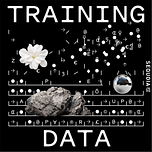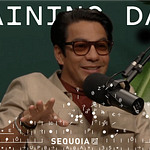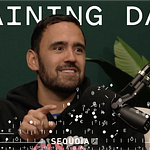Post methodology: Claude 4.0 via custom Dust assistant @TDep-SubstackPost with the system prompt: Please read the text of the podcast transcript in the prompt and write a short post that summarizes the main points. Please make the post as concise as possible and avoid academic language or footnotes. Refer to podcast guests by their first names after the initial mention. Light editing and reformatting for the Substack editor.Block CTO Dhanji Prasanna shared some detailed insights on how the company has moved beyond AI experimentation to deliver measurable impact. Here are the key takeaways for founders from our conversation:
The real AI opportunity: While many Fortune 500 companies struggle to see AI value, Block is tracking 25% manual hours saved by year-end through their AI tools. The secret? Focus on automating workflows and “work about work” rather than trying to solve everything at once. Engineers report saving 8-10 hours per week using their AI agent, goose.
Building vs. buying AI tools: Block developed goose, an open-source AI agent that acts as “arms and legs” for language models, connecting them to real business systems like Gmail, Salesforce and internal tools. Dhanji’s advice: let AI agents learn by doing rather than over-engineering solutions. The agents often figure out better approaches than humans would design.
Organizational Design Matters: Block shifted from a GM structure back to functional organization to accelerate AI adoption. Sometimes you need to reorganize to unlock new technology’s potential. The centralized approach enabled unified policies and faster technical excellence across teams.
The vibe coding era: Non-technical employees are now building functional dashboards and tools through conversational interfaces. This is not only about developer productivity but about democratizing software creation across the organization.
Practical Implementation Tips:
Start with clear success metrics (e.g., manual hours saved)
Use a “recipes” feature to capture and share successful AI workflows
Implement safety controls but don’t over-constrain the technology
Focus on general-purpose capabilities rather than narrow use cases
The big insight: AI’s utility phase is just beginning. Companies that focus on value creation for their core mission rather than chasing hype will emerge as winners.
Hosted by: Sonya Huang and Roelof Botha
Mentioned in the episode:
Proto rig: Modular, state-of-the-art Bitcoin mining hardware made by Block’s Proto division, which also offers open-source fleet management software for rig
goose: Block’s open-source, general-purpose AI agent used across the company to orchestrate workflows via tools and APIs.
Model Context Protocol (MCP): Open protocol (spearheaded by Anthropic) for connecting AI agents to tools; goose was an early adopter and helped shape.
bitchat: Decentralized chat app written by Jack Dorsey
Swarm intelligence: Research direction Dhanji highlights for AI’s future where many agents (geese) collaborate to build complex software beyond a single-agent copilot.
Travelling Salesman Problem: Classic optimization problem cited by Dhanji in the context of a non-technical user of goose solving a practical optimization task.
Amara’s Law: The idea, originated by futurist Roy Amara in 1978, that we overestimate tech impact short term and underestimate long term.









